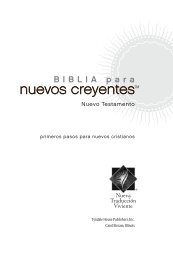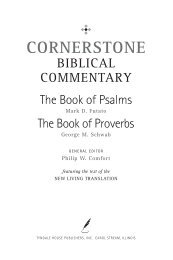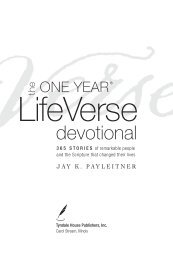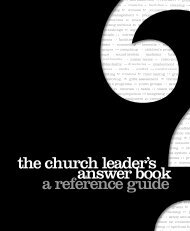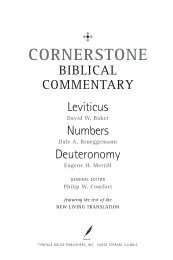Cornerstone Biblical Commentary: Luke and Acts - Tyndale House ...
Cornerstone Biblical Commentary: Luke and Acts - Tyndale House ...
Cornerstone Biblical Commentary: Luke and Acts - Tyndale House ...
You also want an ePaper? Increase the reach of your titles
YUMPU automatically turns print PDFs into web optimized ePapers that Google loves.
LUKE 8<br />
AUDIENCE<br />
We have already noted that the Gospel was specifically addressed to Theophilus<br />
(1:3), a name that means “lover of God.” While the book is profitable to anyone<br />
who loves God, it is probable that it was directed to a specific individual who bore<br />
that name. The description of the person as “most honorable” (Gr., kratistos [TG2903,<br />
ZG3196]) seems to point to a Roman official or at least a man of high social position<br />
<strong>and</strong> wealth, as elsewhere in <strong>Luke</strong>–<strong>Acts</strong> the name is only associated with Roman<br />
governors (<strong>Acts</strong> 23:26; 24:2[3]; 26:25). It is quite possible that this man served as<br />
a patron or benefactor of <strong>Luke</strong>, facilitating the copying <strong>and</strong> distribution of his<br />
work. 11 Such a dedication to a publisher was a common practice at the time. Some<br />
writers have suggested that there were those in the imperial circle who were friendly<br />
to the Christian message, <strong>and</strong> the fact that <strong>Luke</strong>’s writings were addressed to a person<br />
in the higher echelons of Roman society might cause these elites to consider<br />
the Christian proclamation with greater seriousness. This idea is drawn from what<br />
is observed in similar ancient dedicatory prefaces (e.g., Letter of Aristeas 1:1-12;<br />
Talbert [1989:7-11] also discusses other examples; cf. C. A. Evans 1990:19).<br />
Generally in such prefaces there is a definite attempt on the part of such writers to<br />
reach those who would appreciate a “characteristic love of learning.” Thus, it is<br />
quite likely that an appeal to similar readers might have been a part of <strong>Luke</strong>’s intentional<br />
strategy for the acceptance of the gospel message. The fact that <strong>Luke</strong>’s preface<br />
is presented in the most stylistic <strong>and</strong> literary Greek in the New Testament is significant.<br />
<strong>Luke</strong> apparently intended to reach out to open-minded, well-educated readers<br />
who would find such a carefully balanced, sophisticated statement of purpose to be<br />
meaningful. The impact of a cultured, well-organized approach to the presentation<br />
of his case by <strong>Luke</strong> could have possibly had this effect, even if it was not the intended<br />
result of his dedication to Theophilus. At the same time, the actual contents<br />
of his two-volume work are plainly concerned with a wider, more universal audience,<br />
including the poor, the disadvantaged, the marginalized, <strong>and</strong> women. It is a<br />
gospel that shows the breadth of God’s mercy, which reaches out to all branches of<br />
the human family.<br />
In addition, <strong>Luke</strong>’s precise description of his historical method helps the modern<br />
person to identify with the original audience by showing the reader what to expect<br />
from <strong>Luke</strong>’s work. He took his historical task seriously, <strong>and</strong> the text gives every evidence<br />
of fulfilling his stated historical aims. It is therefore necessary to pay close attention<br />
to his preface, which serves as an explanation of his methodology in both<br />
books (1:1-4). Here <strong>Luke</strong>, following the conventions of Greek-speaking historians<br />
like Thucydides <strong>and</strong> Josephus, carefully spells out his historical method so that his<br />
readers might know the principles by which he worked. First, he notes that other<br />
writers had attempted to explain the historical foundation of Christian origins before<br />
him. Second, he observes the special role of “the eyewitnesses <strong>and</strong> ministers of<br />
the word” (1:2, RSV), who could attest everything from the beginning <strong>and</strong> made<br />
careful use of their evidence. Third, he intended to provide “a careful account” of<br />
the Christian movement. Fourth, he claims that he had made a thorough investiga-









